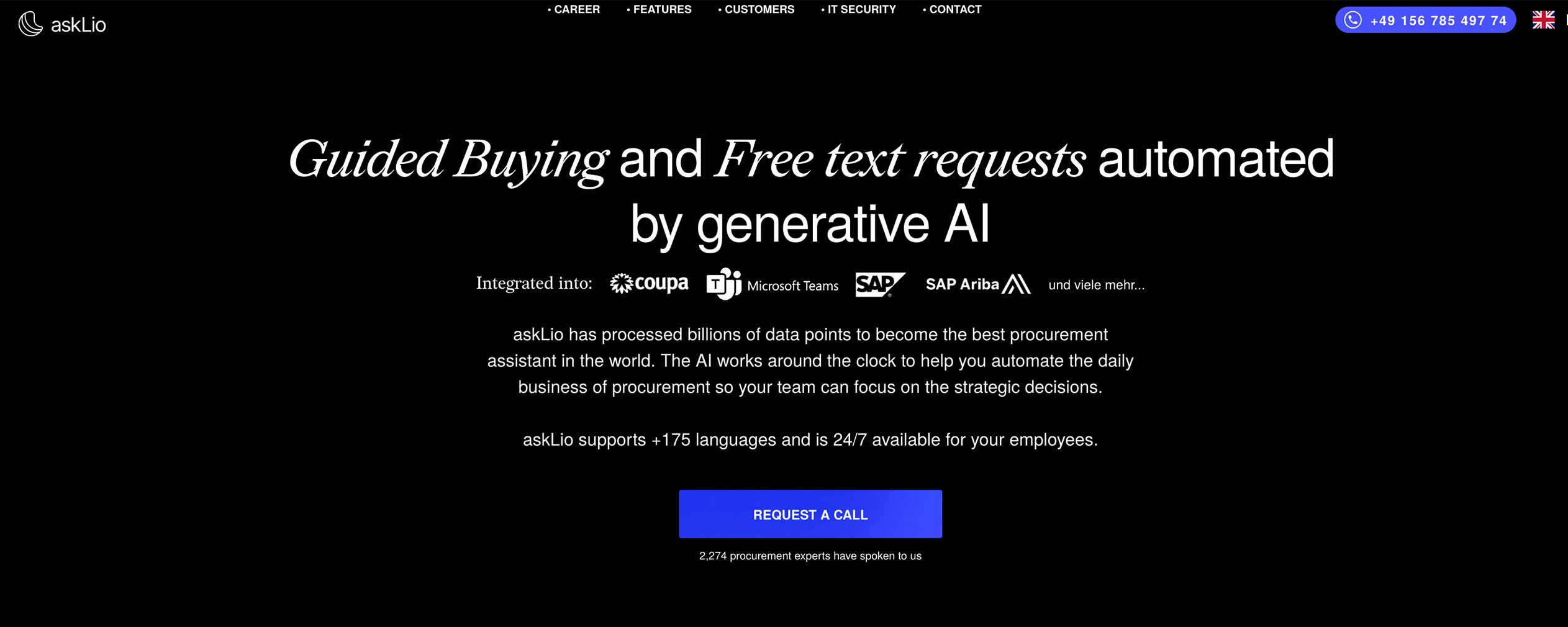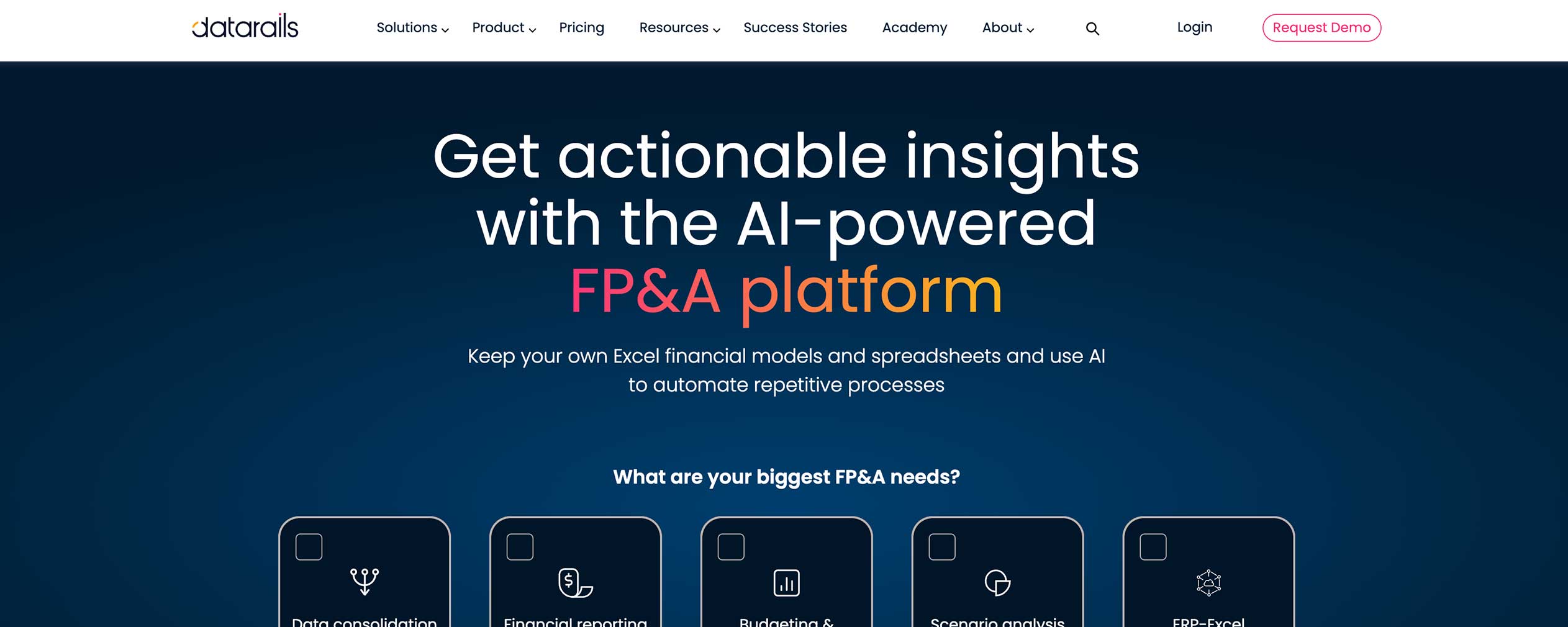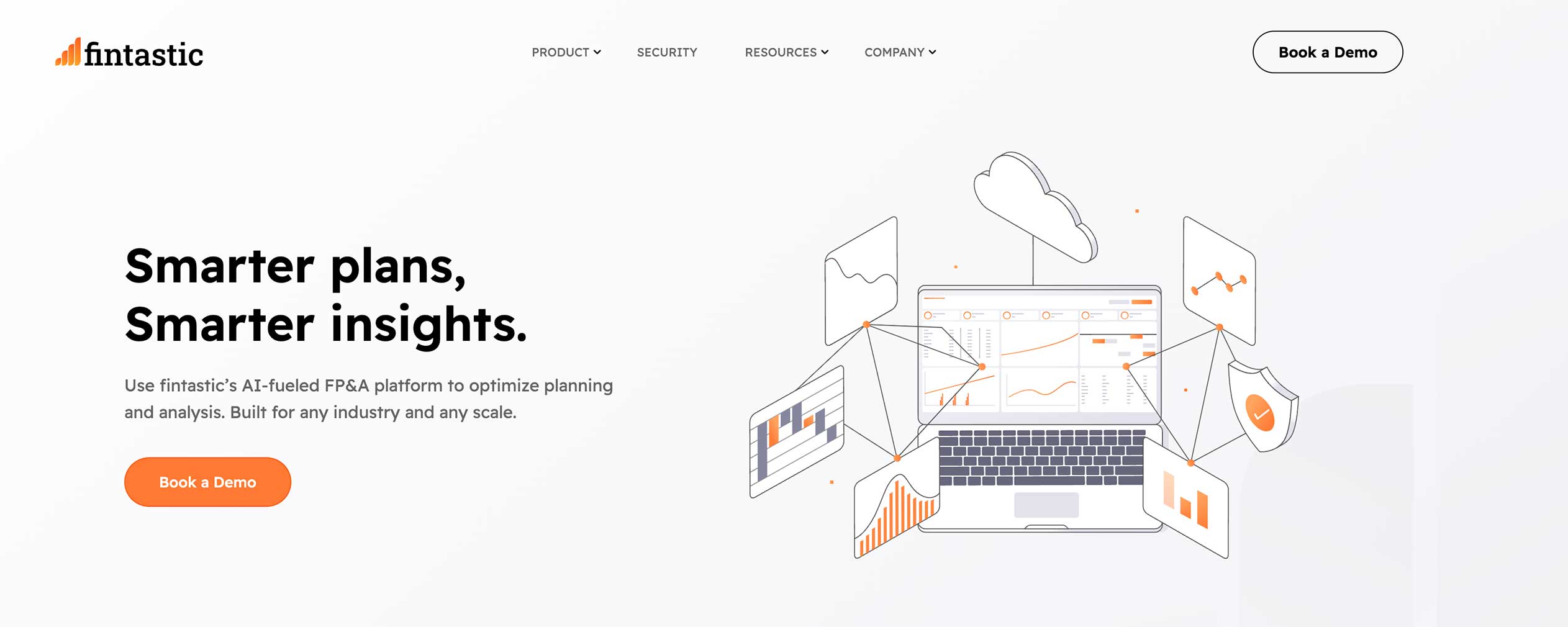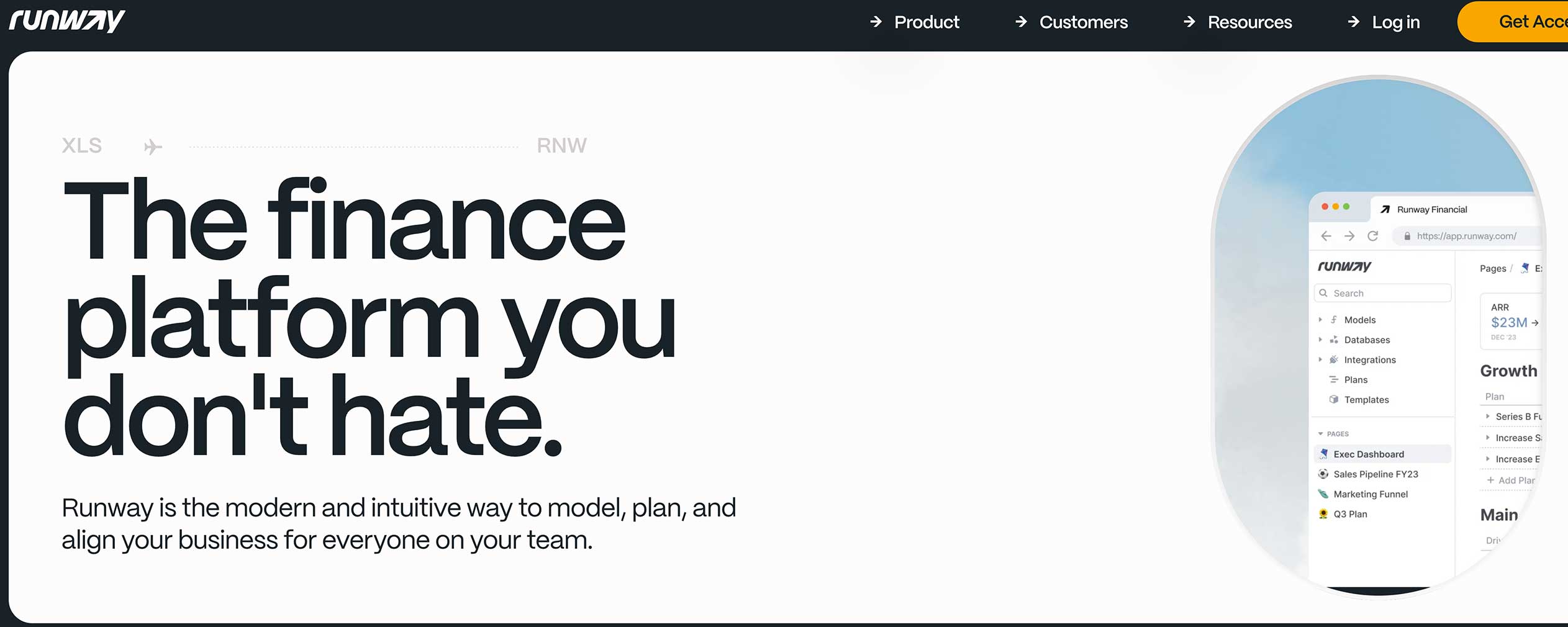Artificial intelligence (AI) is revolutionizing the financial services industry, especially in back-office functions such as data entry, procurement, and financial reporting. These traditionally manual processes often suffer from inefficiencies and human error. However, innovative startups featured on the a16z Enterprise List are transforming this landscape(Don’t miss the rest of our AI Augmentation series as we delve into Customer Experience, Marketing, and Sales). By leveraging AI, companies like askLio and Datarails are automating repetitive tasks, allowing finance professionals to focus on higher-value strategic initiatives.
For instance, Datarails provides an advanced financial planning and analysis (FP&A) platform that streamlines budgeting and reporting through AI-driven automation. Similarly, askLio acts as an AI co-pilot for procurement teams, simplifying vendor management and compliance tasks. These advancements enhance operational efficiency and empower businesses to make informed, data-driven decisions.
As finance departments increasingly adopt AI tools, the implications are profound: reduced operational costs, improved accuracy, and accelerated decision-making processes. This article explores how these a16z-backed startups are leading this change, highlighting their innovative contributions to the finance industry.
Introduction to Artificial Intelligence in Finance
Artificial intelligence (AI) is transforming the finance industry by automating tasks, enhancing decision-making, and improving customer service. Financial institutions are leveraging AI to analyze vast amounts of structured and unstructured data, identify patterns, and make accurate predictions. This technology has the potential to revolutionize the way financial institutions operate, making them more efficient, effective, and customer-centric.
AI in finance encompasses a wide range of applications, from automating routine tasks like data entry and transaction processing to more complex functions such as risk management and fraud detection. By processing large datasets quickly and accurately, AI enables financial institutions to make data-driven decisions that enhance operational efficiency and strategic planning.
Moreover, AI’s ability to analyze unstructured data, such as customer feedback and social media posts, provides valuable insights that can improve customer service and satisfaction. As the finance industry continues to evolve, the integration of AI technologies will be crucial for staying competitive and meeting the demands of a digital economy.
The Role of AI in Automating Finance Back-Office Tasks
The financial landscape is undergoing a significant transformation due to advancements in artificial intelligence (AI). Finance back-office operations—including data entry for subscriptions, receipts, and billing—are increasingly being automated. This shift enhances efficiency and reduces errors, enabling finance teams to concentrate on strategic initiatives rather than mundane tasks.
AI technologies excel at handling repetitive processes that have historically burdened back-office functions. They can process vast amounts of data quickly, ensuring that transactions are recorded and reported accurately. These advancements are driven by complex machine learning models that analyze large volumes of data to optimize processes and improve accuracy. By automating labor-intensive aspects of financial planning and analysis (FP&A), AI improves both accuracy and operational efficiency.
One of the key benefits of AI in finance is its ability to enhance billing processes. Automating these functions saves time and mitigates the risk of human error, a common issue in manual data entry. As firms adopt AI tools, they find their financial operations better aligned with broader business goals.
Integrating AI into finance back-office roles is not just an option; it’s essential for businesses seeking to maintain a competitive edge. The next section showcases the startups leading this transformation and their innovative contributions to finance automation.
Key AI Startups Transforming Finance Back-Office Operations
The rise of AI technologies has significantly altered traditional finance back-office roles. Many of these startups are also leveraging natural language processing to enhance customer service and streamline data analysis. Below, we explore several pioneering startups enhancing efficiency and accuracy in finance operations.
askLio

askLio serves as an AI co-pilot for procurement teams, automating tasks like vendor management and compliance. By offering real-time insights into procurement activities, it enables teams to make informed decisions swiftly, enhancing efficiency and allowing finance professionals to focus on strategic initiatives.
Concourse

Concourse is an AI-powered platform that optimizes workflows in finance and HR operations. It automates processes ranging from payroll management to employee benefits, reducing administrative burdens, saving time, and minimizing errors.
Datarails

Datarails offers an advanced FP&A platform that leverages AI to automate financial reporting, budgeting, and forecasting. This empowers teams to make data-driven decisions with greater accuracy and speed, enhancing resource allocation and strategic planning.
Equals

Equals is a financial planning platform utilizing AI to automate budgeting, forecasting, and reporting. This ensures real-time collaboration among finance teams, aligning financial strategies with overall business goals and enhancing visibility across departments.
Fintastic

Fintastic provides modern FP&A solutions integrating AI for improved budgeting, forecasting, and real-time reporting, essential for agile finance teams in a rapidly changing environment.
Firmbase

Firmbase modernizes financial planning for startups through AI, simplifying reporting and forecasting to help new businesses scale effectively.
Puzzle

Puzzle is an AI-driven accounting platform that automates complex tasks like financial reporting and bookkeeping, enabling finance teams to concentrate on strategic initiatives and improving overall efficiency.
Runway

Runway automates tasks across domains, including finance, with no-code functionality that allows businesses to implement operational automation without extensive technical expertise.
Truewind

Truewind simplifies accounting processes for startups by automating bookkeeping, financial reporting, and tax compliance, ensuring compliance while focusing on growth.
As AI continues to advance, its integration into finance back-office operations becomes essential for maintaining competitiveness. The startups highlighted exemplify AI's transformative potential in finance, offering tools that enable businesses to navigate modern financial management complexities.
Machine Learning in Finance
Machine learning, a subset of artificial intelligence, is revolutionizing the finance industry by enabling machines to learn from data without explicit programming. In finance, machine learning models are used to analyze large datasets, identify patterns, and make predictions, providing valuable insights for decision-making.
One of the primary applications of machine learning in finance is predictive analytics. By training models on historical data, financial institutions can forecast market trends, detect anomalies, and identify potential risks. This capability is essential for developing effective risk management strategies and optimizing investment portfolios.
Machine learning also plays a crucial role in personalizing customer experiences. By analyzing customer data, machine learning models can tailor financial products and services to individual needs, enhancing customer satisfaction and loyalty. Additionally, these models can improve fraud detection by identifying unusual patterns in transaction history, reducing the risk of financial losses.
Despite its numerous benefits, implementing machine learning in finance comes with challenges, such as the need for high-quality data and the complexity of developing accurate models. However, as technology advances, the finance industry will continue to harness the power of machine learning to drive innovation and growth.
AI and Predictive Analytics in Enhanced Financial Planning & Analysis (FP&A)
AI’s role in financial planning and analysis (FP&A) has evolved significantly, paving the way for enhanced automation in forecasting, budgeting, and performance analysis. In a rapidly changing economic landscape, real-time, data-driven decision-making is essential. AI technologies facilitate this shift, allowing organizations to streamline operations and harness insights that drive strategic initiatives. AI emulates human intelligence by performing tasks traditionally associated with human cognitive functions, such as understanding natural language and problem-solving, thereby enhancing FP&A capabilities.
AI-driven tools, like those from Datarails and Fintastic, revolutionize traditional FP&A practices. Datarails automates complex tasks such as financial reporting and forecasting, allowing teams to focus on strategic activities instead of labor-intensive data management. This automation reduces errors and enhances prediction accuracy, enabling businesses to respond quickly to market changes. As highlighted in the Complete Guide to AI in FP&A, companies can utilize machine learning algorithms to analyze historical data and predict future performance with unprecedented precision.
Fintastic reinforces this trend by offering modern FP&A solutions that integrate AI for improved budgeting and reporting. Their platform empowers finance teams to collaborate in real time, aligning financial strategies with business objectives. Insights from Modern FP&A Trends show that such capabilities enhance efficiency and foster agility, enabling organizations to pivot swiftly in response to new opportunities or challenges.
AI’s impact on FP&A goes beyond automation; it enhances analytical capabilities, allowing finance teams to extract actionable insights from complex data. By embracing these technologies, businesses position themselves for informed decisions that drive growth and profitability.
In conclusion, AI integration in FP&A signifies a fundamental shift in finance operations. As organizations navigate modern business complexities, harnessing real-time data will be crucial. Embracing these innovations will improve operational efficiency and empower companies to thrive in an increasingly competitive landscape.
AI in Financial Institutions
Financial institutions are increasingly adopting AI to improve their operations, reduce costs, and enhance customer experiences. AI is being used in various areas, including risk management, fraud detection, customer service, and investment analysis, transforming the way these institutions operate.
In risk management, AI-powered systems analyze large datasets to identify patterns and predict potential risks. Machine learning models can detect anomalies in transaction history, enabling financial institutions to proactively address issues before they escalate. This capability is crucial for maintaining financial stability and compliance with regulatory requirements.
Fraud detection is another critical area where AI is making a significant impact. By analyzing transaction data in real-time, AI systems can identify suspicious activities and prevent fraudulent transactions. This not only protects financial institutions from losses but also enhances customer trust and security.
AI is also revolutionizing customer service in financial institutions. AI-powered chatbots provide 24/7 support, answering customer queries and resolving issues quickly and efficiently. This improves customer satisfaction and frees up human agents to focus on more complex tasks.
In investment analysis, AI algorithms analyze market data to identify trends and opportunities, helping financial institutions make informed investment decisions. By leveraging AI, financial institutions can optimize their investment strategies and achieve better returns.
Overall, the integration of AI in financial institutions offers numerous benefits, including improved efficiency, enhanced security, and better customer experiences. However, it also presents challenges, such as the need for high-quality data and the potential for bias in AI decision-making. As the finance industry continues to evolve, financial institutions must navigate these challenges to fully realize the potential of AI.
The Impact of AI on Procurement, Fraud Detection, and Business Reporting
AI is transforming procurement and business reporting, enabling organizations to automate labor-intensive processes prone to errors. By leveraging AI technologies, companies enhance vendor management, ensure compliance, and generate real-time financial reports, leading to greater transparency and faster decision-making.
A significant advancement in procurement is automating vendor management tasks. Startups like askLio provide AI-driven solutions that streamline purchasing processes and vendor interactions, reducing manual workloads and allowing teams to focus on strategic initiatives.
AI also enhances compliance management by automatically tracking and analyzing procurement activities, ensuring adherence to regulations and internal policies. Tools utilizing AI algorithms can flag anomalies in procurement processes, alerting teams to potential issues proactively.
Real-time financial reporting is another area where AI significantly impacts. Solutions like Truewind's AI Accounting automate financial report generation, providing instant access to crucial financial data. This capability enhances transparency, allowing stakeholders to make informed decisions based on the latest information.
As highlighted in Truewind's resources, AI integration in reporting also facilitates better collaboration across departments. With real-time data, teams can work cohesively, aligning efforts toward common objectives, essential for navigating today's business environment where timely decision-making is vital.
In summary, AI's impact on procurement and business reporting is profound. By automating processes, enhancing compliance, and enabling real-time insights, AI empowers organizations to operate more efficiently. Businesses that leverage AI technologies will gain a competitive edge, positioning themselves for long-term success.
Risk Management and Fraud Detection
Risk management and fraud detection are critical components of the finance industry, and AI is playing a pivotal role in enhancing these functions. By analyzing large datasets and identifying patterns, AI systems can predict potential risks and detect fraudulent activities, providing financial institutions with valuable tools to safeguard their operations.
In risk management, machine learning models are trained on historical data to identify patterns and predict future risks. These models can analyze various factors, such as market trends, transaction history, and customer behavior, to provide accurate risk assessments. This enables financial institutions to develop effective risk management strategies and mitigate potential threats.
Fraud detection is another area where AI is making significant strides. AI-powered systems analyze transaction data in real-time to identify unusual patterns and flag suspicious activities. By detecting anomalies early, these systems can prevent fraudulent transactions and reduce financial losses. This not only protects financial institutions but also enhances customer trust and security.
AI’s ability to process and analyze large volumes of data quickly and accurately makes it an invaluable tool for risk management and fraud detection. However, the effectiveness of these systems depends on the quality of the data and the accuracy of the machine learning models. Financial institutions must invest in high-quality data collection and model development to fully leverage the potential of AI in these areas.
Case Studies: AI in Action in Finance Back-Office
Integrating AI into finance back-office operations has become a game-changer for companies seeking to streamline processes and enhance performance. This section presents real-world case studies from notable startups, Runway and Concourse, showcasing AI's effective transformation of their finance operations.
Runway exemplifies AI's potential in revolutionizing finance functions. As a no-code platform, it empowers teams to automate tasks from data entry to complex reporting. According to Runway's AI Capabilities, the company leverages AI to foster a collaborative environment where every role contributes to automation. By streamlining operations, Runway significantly reduces the time and resources needed for traditional finance tasks, increasing efficiency and allowing teams to focus on strategic decision-making.
Similarly, Concourse optimizes finance and HR workflows through its AI-driven platform. It automates processes like payroll management, compliance checks, and employee benefits administration, minimizing errors and accelerating processing times. Concourse's approach enhances accuracy and improves employee satisfaction by reducing the manual task burden. The impact of AI at Concourse illustrates how technology can create a more responsive finance function, leading to better business performance.
Both case studies highlight the importance of adopting AI as a strategic tool in finance operations. By automating repetitive tasks and enhancing collaboration, these startups exemplify how AI can lead to significant cost reductions and performance improvements. As businesses navigate modern finance complexities, insights from Runway and Concourse illustrate how AI can achieve operational excellence.
The transformative power of AI in
finance back-office operations is evident through these case studies. As organizations explore AI capabilities, early adopters will gain a competitive edge in an increasingly digital landscape. The next section will delve into future trends and the evolving role of AI in finance, providing insights on how businesses can prepare for what's next.
Challenges and Ethical Considerations
While AI has the potential to transform the finance industry, it also presents several challenges and ethical considerations that need to be addressed. One of the biggest challenges is the need for high-quality data to train machine learning models. Without accurate and comprehensive data, AI systems may produce unreliable results, leading to poor decision-making.
Transparency and explainability are also critical issues in AI decision-making. Financial institutions must ensure that AI systems are transparent and that their decisions can be explained and understood by humans. This is particularly important in areas such as risk management and fraud detection, where the consequences of AI decisions can be significant.
Ethical considerations, such as the potential for bias in AI decision-making, must also be addressed. AI systems can inadvertently perpetuate existing biases in the data, leading to unfair outcomes. Financial institutions must implement measures to identify and mitigate bias in AI systems to ensure fair and equitable decision-making.
Data privacy and security are other important considerations. Financial institutions must ensure that customer data is protected and that AI systems comply with data privacy regulations. This includes implementing robust security measures to prevent data breaches and unauthorized access.
In conclusion, while AI offers numerous benefits for the finance industry, it also presents challenges and ethical considerations that must be carefully managed. Financial institutions must invest in high-quality data, ensure transparency and explainability, address bias, and protect data privacy and security to fully realize the potential of AI. By doing so, they can harness the power of AI to drive innovation and growth while maintaining trust and integrity.
The Future of AI in Financial Institutions: What to Expect Next
As businesses navigate a complex financial landscape, AI integration is set to redefine finance's future. The rapid evolution of AI technologies, especially alongside blockchain and advanced analytics, signals a transformative shift enhancing efficiency, compliance, and decision-making processes. Startups like Runway and Concourse exemplify this trend, demonstrating how AI solutions can streamline operations and reduce costs.
AI's integration with blockchain enhances transparency and security in financial transactions. By leveraging distributed ledger technology, companies can boost data integrity and automate compliance processes. Advanced analytics powered by AI will enable organizations to extract insights from vast datasets, facilitating proactive decision-making aligned with real-time market conditions. As noted in Datarails' guide, AI-powered FP&A tools are becoming essential for organizations seeking a competitive edge.
Moreover, businesses must prepare for evolving trends by adopting flexible AI systems that adapt to changing regulatory environments. Solutions that automate compliance tasks mitigate risks and free up resources for strategic initiatives. The growing importance of AI in finance underscores the need for continuous investment in technology and talent.
In conclusion, the future of AI in finance is bright, with the potential to fundamentally reshape operations. Organizations embracing these innovations will be well-equipped to thrive in a digital economy. Understanding AI's implications and preparing for its integration will be crucial for maintaining a competitive advantage.
Conclusion
In summary, integrating AI into finance back-office operations is no longer a futuristic concept; it's a necessity for organizations aiming to excel in a competitive landscape. Early adoption of AI technologies enhances efficiency, reduces errors, and enables real-time data-driven decision-making.
Companies like Datarails and Truewind exemplify how AI-powered tools revolutionize financial planning and reporting, providing a strategic edge. Business leaders must prioritize AI investment and foster a culture embracing these innovations. By doing so, they position their organizations to adapt swiftly to evolving market dynamics, leveraging AI's full potential to streamline operations, enhance compliance, and drive sustainable growth. The time to act is now; those who hesitate may be left behind in an increasingly digital economy.
References
- a16z | Vertical SaaS Now with AI Inside
- Datarails | The Complete Guide to AI in FP&A
- Fintastic | Modern FP&A Trends
- TechCrunch | Firmbase Raises $12M to Modernize Financial Planning for Startups
- SaaStr | Why Every Role is a Prompt Engineering Role and No-Code AI Tips with Runway's CEO Siqi Chen
- Truewind | Easier Accounting
- Giselle | Vertical AI : Shaping Industry-Specific Solutions for the Future
- Giselle | Generative AI: Unlocking the Future of Business Productivity and Economic Growth
- Giselle | AI-Powered OCR Benefits for Document Management and Expense Automation
- Giselle | Beyond Chat: Why Multimodal Interfaces Are the Key to Adoption
- Giselle | The AI Transforming Venture Capital: 2024 Investment Trends and Future Outlook
Please Note: This content was created with AI assistance. While we strive for accuracy, the information provided may not always be current or complete. We periodically update our articles, but recent developments may not be reflected immediately. This material is intended for general informational purposes and should not be considered as professional advice. We do not assume liability for any inaccuracies or omissions. For critical matters, please consult authoritative sources or relevant experts. We appreciate your understanding.
